Utah Biographies ~ Walker to Weir
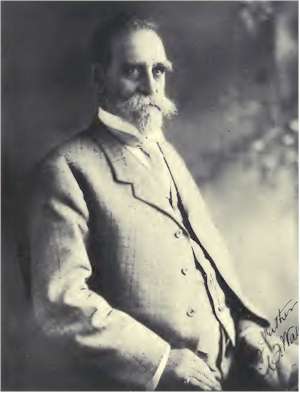
Walker, Fredrick Walter
The history of the inter-mountain country would be incomplete
without the name of David F. Walker, who for over fifty-seven
years has been one of the leading business men and most
prominent and progressive citizens of Utah. David F. Walker was
born April 19th, 1838, at Yeadon, Yorkshire, England. He was the
third of the four famous Walker brothers, all of whom
contributed so much to the up-building of Utah. His father was
Matthew Walker, who was a wool merchant and hotel proprietor in
England. He died in St. Louis, in 1850, on the way to Utah. His
mother was Mercy (Long) Walker, who passed away in Salt Lake
City in December, 1863. David F. Walker was educated in the
public schools of England. He arrived in Salt Lake City,
September 20th, 1852, being then but a boy of fourteen.
David F. Walker's first occupation in life after arriving in
this country was as a peddler of notions in St. Louis, where he
stayed for two years. Upon his arrival in Salt Lake he entered
the employ of William Nixon, formerly of St. Louis, but then
know r n as "The Father of Utah Merchants," who conducted a
general merchandise store. Mr. Walker remained in this position
until the spring of 1859, at which time (July 1st) the firm of
Walker Brothers was established at Camp Floyd about forty miles
southwest of Salt Lake. The four brothers made up the firm.
David F. Walker was the prime mover in starting the business,
having got the first stock of goods on credit, the stock
consisting of $90,000 worth of goods. The firm, which was
originally formed for the purpose of selling supplies to the
soldiers then encamped at Camp Floyd, remained there until the
departure of the troops, when the stock was removed to Salt Lake
City and the foundation laid for the present mammoth store which
is second to none in Utah in every respect. The business was
continued by the Walker brothers until 1886, and on January 20th
of that year, Mr. Walker retired from the firm, selling out his
interest to the remaining three brothers. In 1888 Mr. Walker
went to San Francisco and entered business there. He built a
magnificent country residence at San .Mateo, California. It has
four acres of lawn and covers six acres of rare plants and other
foliage. The house has a frontage of one hundred feet and a
ninety-foot depth, and is built in old Southern colonial style.
Mr. Walker takes great pride in his California home and loves to
work about the grounds among the plants and flowers, which is
his chief recreation.
Mr. Walker was first married to Emeline Holmes, May 18th, 1859.
She died in August, 1876, and their children were Emeline,
Sarah, Ann, David F., Jr., Henry W., Maud, and Stella May.
On October 25th, 1883, Mr. Walker was married to Althea Hunt,
who came from an old New York family and was born, in the old
Ninth Ward in New York City. To them have been born three
children, of whom two are living, Althea Margaret and Clarence
Hollister.
Mr. Walker is a member of the Pacific Union Club, and the
Burlingame Country Club, of San Francisco, and a former member
of the Alta Club, Salt Lake City, Utah.
Mr. Walker's residence in Salt Lake City is at No. 75 C Street.
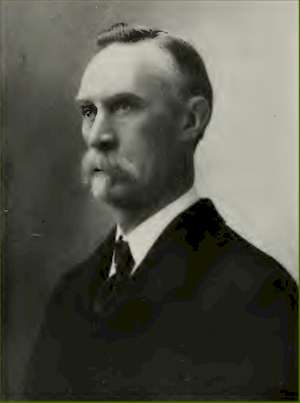
Walker, Matthew H.
Matthew H. Walker is one of the real
pioneers of Utah, and the name of Walker is one of the best
known and most respected in the intermountain region. Mr. Walker
has gone through the rigors and hardships of the early settlers
of Utah and by his own perseverance and industry has risen, and
today is one of the leading financiers and business men of the
Western country.
Matthew H. Walker is a son of Matthew
and Mercy Long Walker. His father was a woolen merchant and
hotel proprietor at Yorkshire, England, where Matthew H. was
born January 16, 1845. When but five years of age he emigrated
to America, and in 1852 he took the long and tedious wagon
journey across the country to Salt Lake City, being but seven
years old at the time of his arrival. He has seen the evolution
of this great city from a vast wilderness to the splendid city
it is today, and to him much of the credit of its magnificent
up-building belongs; because he was ever foremost and the first
to come to the front with his purse and brains when any
progressive movement was at hand.
His education was meager, as in those
days they had to do the best they could with the facilities they
had for schools. But Mr. Walker managed to secure enough
education to win for himself the distinction of being one of
Utah 's most distinguished and successful citizens, and to
occupy a position in the financial and mercantile world second
to none in the inter-mountain region.
Mr. Walker is the head of the firm of
Walker Brothers, Bankers, for fifty years one of the largest
financial institutions in Utah, established in 1859, and a
stockholder in Walker Bros. Dry Goods Company.
He is actively connected with the
Opex Mines Company, Honerine Extension Mining Company, and many
other mining companies throughout the inter-mountain region. Mr.
Walker has never held political office of any kind, devoting his
entire time and attention to his many business enterprises.
He is a member of the Alta Club,
Commercial Club, Country Club, the Young Men's Christian
Association, and the Wasatch Lodge of Free and Accepted Masons.
Mr. Walker was married January 1, 1865, to his first wife, who
died in 1896, and in 1897 he married his present wife. He is the
father of two children, John H. and Frances Glen Walker.
Mr. Walker is to-day rated as one of
the foremost financiers and most public-spirited citizens of
Utah. The only public office he ever held was that of member of
the Board of Education, elected in and holding the position from
1898 until 1902.
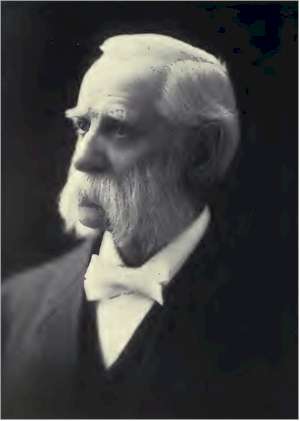
Wallace, Henry
From
making molasses to making confectionery, and then to making
crackers, until lie became the head of the National Biscuit
Company, the largest manufacturer of crackers in this
inter-mountain empire, and, while doing this, to look after
various other matters, including a mission to the old world,
would indicate that the person who did all this must have
wonderful vitality and nerve and push. This is the career of
Henry Wallace, head of the National Biscuit Company in Utah.
Born in Somersetshire, England, April 27, 1840, his parents
being of good old Scotch stock, his father a cloth-weaver, Henry
Wallace soon learned what it was to labor; and, after acquiring
an education in the National school, he was apprenticed to a
confectioner and baker in Frome, England, which trade he
mastered.
When in his fourteenth year he was
baptized into the Church of Jesus Christ of Latter-day Saints,
and since then has been a firm believer in that faith. At
twenty-two years of age he went to London, and in his
twenty-third year he left England for Utah, sailing from
Liverpool, May 12, 1862, and arriving in Salt Lake City, October
5th of the same year. His trip across the plains from St. Joseph
was made with the Hancel Harmon party.
On arriving here, Mr. Wallace worked
with Levi North at Mill Creek, making molasses. He then worked
at the carpenter's trade for about nine months, during which
time he made seats for the Tabernacle at Bountiful. Then he
engaged with William Eddington, who ran a general store, bakery
and lunchroom. This was in 1863. Four years later he bought out
the business, which he continued until 1875, when he closed up
the business and entered the company of Jennings and Saddler,
and at once was put in charge of the grocery department. He
remained ten years with this firm, and in April, 1885, he formed
a partnership with George Husler and purchased the business of
the Utah Cracker Company. This business was continued until
1889, when the firm dissolved, Mr. Wallace purchasing his
partner's interest, and continuing the business until 1892, when
he sold his establishment to the American Biscuit &
Manufacturing Company, Mr. Wallace remaining as manager. Six
years later, when the National Biscuit Company was formed, the
American Company in Salt Lake was dissolved and Mr. Wallace was
made manager of the new corporation, which position he still
retains.
Mr.
Wallace has always been a business man. Politics has had no
allurements for him, although he has been tendered many
nominations. He did consent to serve the people twice, once as a
member of the Salt Lake City Council in 1907, and as school
trustee of the Seventh District. It was while in the latter
position that a contest between the Mormons and non-Mormons
occurred over a tax voted by the former for the erection of a
schoolhouse, which was finally decided by Judge Zane in favor of
the Mormon trustee.
Mr. Wallace was married on February
7, 1863, to Miss Ellen Harper. Nine children were born to them,
all of whom are living. They are: Henry J., William R., Howard
A., Rosetta E., George H., Mary Ellen, Walter A., Mabel K., and
Ashley H.
Mr. Wallace is one of the best known
citizens of Salt Lake City, and is a hale, hearty and vigorous
man. In politics he is a Democrat. He is a member of but one
club, the Commercial Club of Salt Lake City.
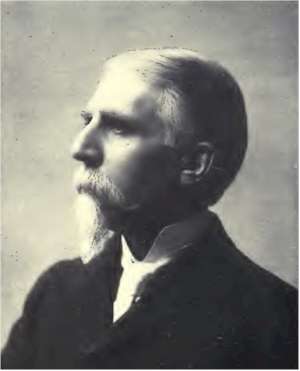
Webber, Thomas G.
Colonel
Thomas G. Webber has been for nearly forty years one of the most
progressive and busiest of men in Utah. He has led an active
business life and, as director and general manager of the Zion's
Cooperative Mercantile Institution, and many other important
interests in and about Salt Lake City, he has done much towards
the up-building of Utah.
Colonel Webber was born in Exeter,
England, September, 1836, of an old Devonshire family living for
centuries in the vicinity of that ancient town. His parents were
Thomas Bray Webber and Charlotte B. Webber. His father was a
scientific man, a civil engineer and government superintendent
of the telegraph lines in Devon and Cornwall, and the son
followed the father's profession, and was trained in that line,
being placed in an engineer's office shortly after the death of
his mother when he was sixteen years of age. While studying his
profession the opportunities of the new world appealed to him
and he made up his mind to go to the United States. Therefore,
in 1855, he sailed for America and shortly after he arrived he
opened an engineer's and surveyor's office. In 1857, when the
Government troops, under General Albert Sydney Johnston, were
ordered to Utah, Colonel Webber, then a youth of twenty, entered
the United States army. He served in Arizona and California
until the outbreak of the Civil War, when he went by way of
Panama with a portion of his regiment, marching to Fortress
Monroe, and, under McClellan, Burnside, Hooker and Meade, he
participated in the Peninsular and other campaigns, including
the battles of Yorktown, Williamsburgh, Gaines Mill, White Oak
Swamp, Fredericksburg, Kelly's Ford, Chancellorsville,
Gettysburg and Williamsport, and saw plenty of active service.
He remained with the army until the fall of 1863, passing
through the various grades and becoming commissary quartermaster
and adjutant of his regiment.
Colonel Webber first came to Salt
Lake City in 1864, by stage coach from Atchison, Kansas. On May
25, 1867, he was married to Miss Mary E. Richards, a daughter of
Franklin D. Richards, who was a patriot and a brigadier-general
in the Utah Militia. Colonel Webber afterwards became a
lieutenant-colonel of artillery, and later adjutant of the
Second Brigade and a member of General Richards' staff.
In 1864 he
became, with T. B. H. Stenhouse, one of the founders of "The
Salt Lake Daily Telegraph," the first issue of which appeared on
the Fourth of July, of that year. Mr. Webber was business
manager and remained with the paper until its removal to Ogden
in 1869, when he left to accept a position with Zion's
Co-operative Mercantile Institution. He was destined for early
promotion, and in October, 1871, he was chosen secretary, and
shortly after, treasurer of the Z. C. M. I. In 1876 Colonel
Webber went abroad on a religious mission, and toured England,
France, and Italy, returning to America in 1878 to assist in the
settlement of the late Brigham Young's estate. He again took up
the position of secretary and treasurer of the Z. C. M. I., was
afterwards elected manager, and has been actively identified
with its interest up to the present time.
Colonel Webber is president of the
Zion's Benefit Building Society, director in the Zion's Savings
Bank and Trust Company, Home Fire Insurance Company, Postal
Telegraph Company, and Utah Light and Railway Company. He was
councilman from the Second Municipal Ward for two years, and
alderman for four years. He was president of the Salt Lake and
Ogden Gas and Electric Light Company from 1896 to 1898, and of
the Salt Lake Public Library from 1897 to 1904; vice-president
of the Utah Light and Power Company from 1898 to 1903, and a
director of the Utah Sugar Company from 1899 to 1902.
Colonel Webber is the father of six
children, William T. F., Shirley T. B., Charlotte B. R.,
Georgiana M. B., Ethelyn E. L. F., and Mildred R. Webber. He is
a member of the Alta and Commercial clubs, and resides at 131
Second Avenue, Salt Lake City, Utah. Colonel Webber is
public-spirited, liberal and charitable, and a man of sterling
qualities and kindly disposition, and a credit to any community.
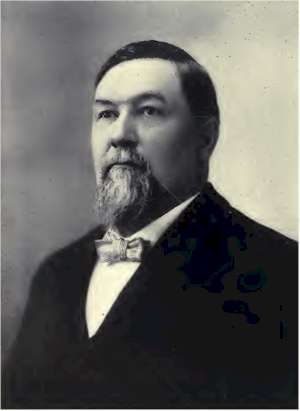
Weir, Thomas
Thomas Weir was born February 14th,
1855, near Cambridge, Washington County, New York; his father,
John Weir, a carriage maker; his mother, Agnes Glover.
He obtained an academic course at
Washington County Academy, at Cambridge, New York, and graduated
at the head of his class in 1876, from Union College in mining
and civil engineering. Mr. Weir went from New York to Nebraska
in March, 1877, and in the fall of that year was appointed the
assistant engineer of the Missouri River improvement work at
that point. He was transferred to the Mississippi River
Commission in 1878, and given charge of work in the lower river.
In 1879 he resigned and went to
Leadville, Colorado, and in 1880 was appointed assistant manager
of the A. Y. Mine, and three years later was appointed general
manager of the A. Y. mine and Minnie mine, both of which
properties became prominent dividend-payers under his
management. From 1888 to the summer of 1893, he was general
man-ager of the Granite Mountain Mining Company's properties at
Granite, Montana.
Mr. Weir came to Salt Lake City,
February 24, 1894, and in 1896 secured the ground in Bingham
that formed the basis of the Highland Boy Mining Company and
became its general manager. He erected the first Bleichent
tramway in Utah. In 1899 he secured the ground and became the
manager of the Boston Consolidated Mining Company. He is also a
director of the Ohio Copper Company, president of the Ajax
Mining Company, and vice-president of Walker Brothers' Bank. He
has never held political office, but he is a member of the Alta
Club, the Salt Lake Commercial Club, and an elder in the First
Presbyterian Church.
Mr. Weir was married June 15th, 1886,
to Miss Clara Pond Treadway, in Denver, Colo. The home of Mr.
and Mrs. Weir is among the stateliest of the many handsome
residences that ornament that handsome street, the number being
519 East Brigham Street. It occupies an acre and a quarter of
ground on the corner of Brigham and "F" Streets, the extensive
velvet lawn and perfectly kept surroundings making it one of the
most attractive residences in the city. The house is large and
commodious, is of native, creamy colored sandstone, has a total
of fifteen rooms, is of Colonial style and provided with all the
modern conveniences which contribute to comfort and beauty.

Index

Source: Sketches of the Inter-Mountain
States, Utah, Idaho and Nevada, Published by The Salt Lake
Tribune, Salt Lake City, Utah, 1909
|


